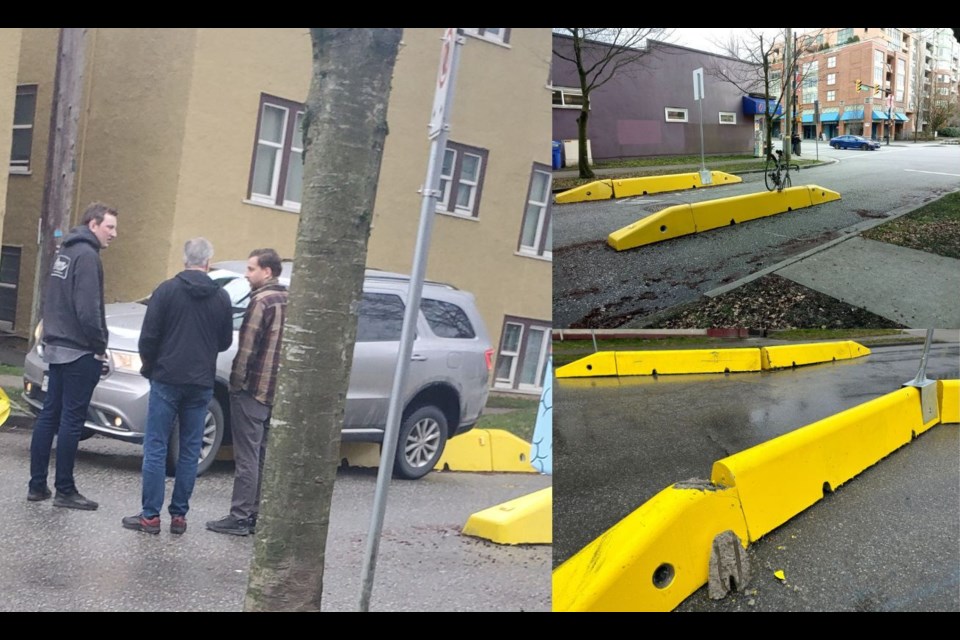Late last year, 200 parking spots were reallocated for traffic gateways as part of the City of Vancouver's Slow Streets program.
The program first came into effect with temporary plastic barriers in 2020 but this winter they were swapped out for two different types of permanent concrete "pinch points" that only allow one direction of vehicle traffic at a time, forcing drivers to slow down as they approached and exit major streets into designated "Slow Streets."
Drivers even potentially have to wait for exiting vehicles before entering a Slow Street.
"The new barriers were installed at major street intersections on the Slow Street networks where site conditions permit," the city tells V.I.A. in an emailed statement. "Reasons why we might not have installed barriers include the street being too narrow, existing traffic calming such as a median or diverter, parking constraints in the area, and curbside use such as a Mobi station near the intersection."
The Slow Streets network covers about 40 km of roadway throughout the city, including the Fairview, Strathcona, Commercial Drive, and Little Mountain areas.
What's the point?
"The barriers reduce the street width similar to a scenario that exists on many local streets in Vancouver with parking on both sides of the streets," says the city.
"The configuration of the barriers does not prohibit two-way traffic, but does limit vehicle traffic to one direction at a time at the intersection. The barrier placement encourages lower speeds, supporting the goal of the Slow Streets initiative to provide a safe and comfortable street environment for different users."
Essentially they're a purposeful bottleneck.
Vehicles turning onto slow streets from major thoroughfares are required to yield to oncoming traffic and cyclists. There is space to cycle on the other side of the barrier between the sidewalk in most instances, but the two different barrier types depend on the existing width of the street.
The city is currently collecting speed data as well as qualitative information on driver behaviour at the gateways to determine the success of the project and while they say, "initial site observations have noted a reduction in driver speeds as they enter the neighbourhood," many residents have expressed concern over the nicknamed "banana barriers."
Local reaction to "banana barriers"
The yellow bump-outs have proved very divisive among Vancouverites who are reporting several collisions between cars and the barriers.
When the temporary plastic barriers were first erected there was a similar problem with residents posting pictures to Twitter of the barriers placed vertically in the centre of the road, essentially delineating two lanes instead of creating one. Now that they are less easily moved locals are sharing photos of the chipped and battered concrete.
Supporters of the slow streets are blaming cars and poor drivers for the chaos and think that the concrete damage is indicative of the potential dangers to pedestrians and cyclists. Some have even gone so far as to put stickers on the barriers that read "cars ruin cities" and "the war on cars."
A viral Tweet from CKWN journalist Jill Bennet has also spurred over 4,000 responses and plenty of memes from people on both sides of the argument.
One frustrated resident calls the project misguided and thinks the removal of parking will cause cars to drive around more than necessary.
The City tells V.I.A., "staff are monitoring the effect of the barriers and are making changes at locations where needed."
"Staff have observed vehicles of all sizes, including semi-trucks, navigate the barriers without issue. We are not aware of any vehicle-vehicle, vehicle-bicycle, or vehicle-pedestrian collisions at these locations since the barriers were installed," they continue but images continue to surface online.
Some have asked if the city has considered other options, like speed bumps.



